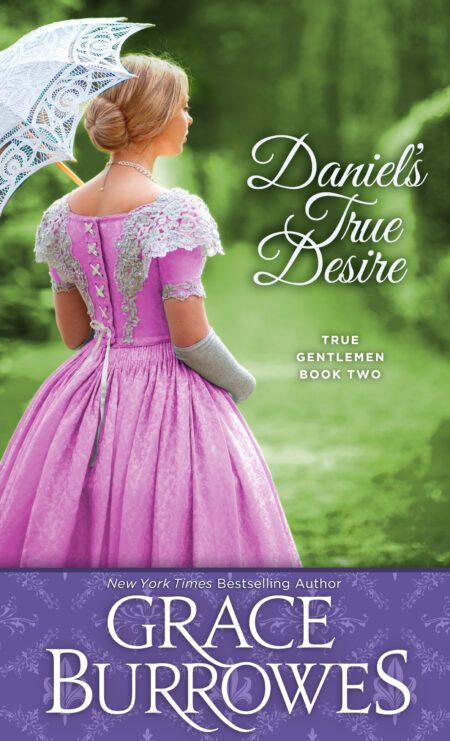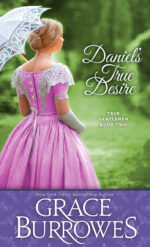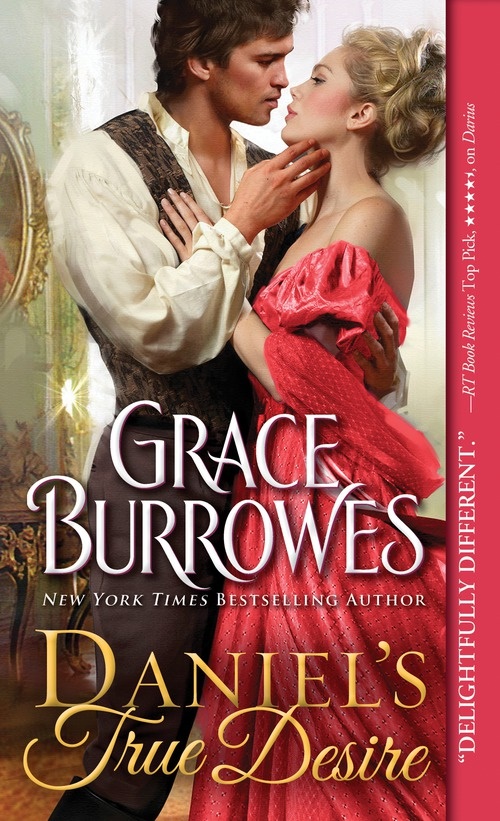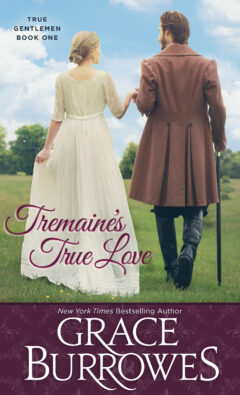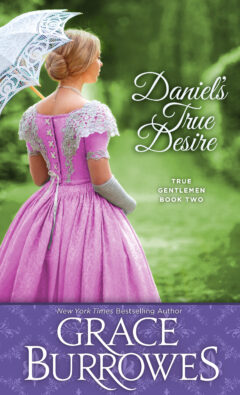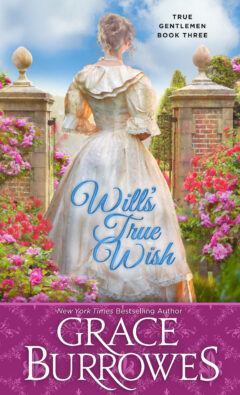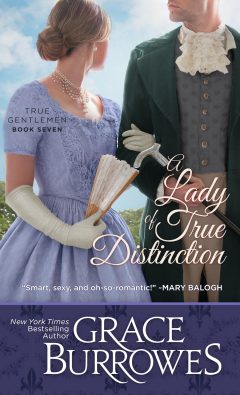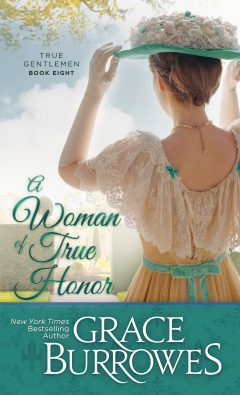Daniel’s True Desire
Book 2 in the True Gentlemen series
Daniel Banks is a man of the cloth whose vocation is the last comfort he has left. In an attempt to start his life over, Daniel accepts the post of vicar in Haddondale, a position supported by the Earl of Bellefonte. There Daniel meets Lady Kirsten Haddonfield, to whom life has also dealt multiple unkind blows. Daniel’s interest is piqued by Kirsten’s unsentimental attitude toward her misfortunes, and by the kind-heartedness the lady keeps well hidden. Kirsten is much taken with Mr. Banks and his genuine compassion for others, despite his own troubles. When Providence intervenes, and Daniel and Kirsten can become engaged, their happiness seems complete…. though every garden has at least one nasty, sly, determined serpent.
Enjoy An Excerpt







Chapter One
“Why must all and sundry entertain themselves by telling me falsehoods?”
Daniel Banks’s teeth chattered as he put that conundrum to his horse, who had come to a halt, head down, sides heaving, before the only building in sight.
“‘Ye can’t miss it,’” Daniel quoted to himself. “The only lane that turns off to the left half a mile west of the village.”
This was not Belle Maison, the family seat of the Earl of Bellefonte. Daniel had listened carefully to the directions given to him by the good folk at The Queen’s Harebell. They’d sent him, in the middle of a roaring snow storm, to a mean weathered cottage, albeit one with a light in its single window.
“I’ll be but a moment,” Daniel promised his gelding.
Daniel’s boots hit the snowy ground and agony shot up limbs too long exposed to the cold. He stood for a moment, waiting for the pain to fade, concocting silent epithets when he ought to have been murmuring the Twenty-Third Psalm.
“Halloo, the house!” he called, thumping up three snowy steps. The porch sheltered a small hoard of split oak firewood. Somebody within burned that oak, for the frigid air held a comforting tang of smoke.
The wind abated once Daniel ducked under the porch’s overhang, though he did not tarry to appreciate the beauty of an early spring storm. He needed a fire, some victuals, and proper directions, though only the directions mattered.
A man of God was supposed to welcome hardships, and Daniel did, mostly because his store of silent, colorful language was becoming impressive.
He raised a gloved fist to knock on the door. “Halloo, the—!”
The door opened, Daniel’s sleeve was snatched into a tight grasp, and he was yanked into the warmth of the cottage so quickly he nearly bumped his head on the lintel.
“I said I’d be home by dark,” his captor muttered, “and full dark is yet another hour away. I was hoping this infernal snow would slow down.” The woman fell silent, for Daniel’s sleeve was in a young lady’s grip. “You’re not George.”
Alas for me. “The Reverend Daniel Banks, at your service, madam. I lost my way and need directions to Belle Maison, the Bellefonte estate. Apologies for intruding upon your afternoon.”
Though, might Daniel please intrude until at least his feet and ears thawed? Beelzebub was a substantial horse who grew a prodigious winter coat. He’d tolerate the elements well enough for a short time.
While Daniel was cold, tired, famished, and viewed his upcoming visit to the earl’s grand house as a penance at best.
“Your gloves are frozen,” the lady noted, tugging one of those gloves from Daniel’s hand. “What could you be thinking, sir?” She went after his scarf next, unwinding it from his head, though she had to go up on her toes. She appropriated his second glove, and shook the lot, sending pellets of ice in all directions.
What had he been thinking? Lately, Daniel avoided the near occasion of thinking. Better that way all around.
“You needn’t go to any trouble,” Daniel said, though the warmth of the cottage was heavenly. A kettle steamed on the pot swing, and the scent of cinnamon—a luxury—filled the otherwise humble space. Somebody had made the dwelling comfy, with a rocking chair by the fire, fragrant beeswax candles in the sconces, and braided rugs covering a plank floor.
“I can offer you tea, and bread and butter, but then surely we’ll be on our way. I’m Kirsten Haddonfield, Mr. Banks, and we can ride to Belle Maison together.”
Haddonfield was the family name that went with the Bellefonte title.
“You’re a relative to the earl, then?”
She wore a plain dark blue wool dress, high-necked, such as a farmer’s wife would wear this time of year. Not even a cousin to an earl would attire herself thus unless she suffered excesses of pragmatism.
“I am one of the earl’s younger sisters, and you’re half frozen. I hope those aren’t your good boots, for you’ve ruined them.”
“They’re my only boots.”
Swooping blond brows drew together over a nose no one would call dainty, and yet Lady Kirsten Haddonfield was a pretty woman. She had good facial bones, a definite chin, a clean jaw, and blue eyes that assured Daniel she did not suffer fools—lest her tone leave any doubt on that score.
Daniel was a fool. Witness, the ease with which the yeoman at the inn had bamboozled him. Witness, the ease with which his own wife had bamboozled him.
“At least sit for a moment before the fire,” the lady said, arranging his scarf and gloves on pegs above the hearth. “Did you lose your way because of the weather?”
Daniel had lost his way months ago. “The weather played a role. Are you here alone, my lady?”
She folded her arms across a bosom even a man of the cloth acknowledged as a fine bit of work on the Creator’s part.
“I am on my family’s property, Mr. Banks, and they well know where I am. The weather is not only foul, it’s dangerous. If you must prance out the door to die for the sake of manners, I’ll not stop you. The groom or one of my brothers should be here any minute to fetch me home. We’ll note into which ditch your remains have fallen as we pass you by.”
The fire was lovely. Her ferocity, though arguably unchristian, warmed Daniel in an entirely different way. Nowhere did the Bible say a Good Samaritan must be excessively burdened with charm.
“You aren’t much given to polite dissembling are you, my lady?” For an earl’s daughter was a lady from the moment of her birth.
She marched over to the sideboard and commenced sawing at a loaf of bread. “I’m not given to any kind of dissembling. You should sit.”
“If I sit, I might never rise. I’ve journeyed from Oxfordshire, and the storm seems to have followed me every mile.”
“Why not tarry in London and wait out the weather?”
Because had Daniel spent another night in London, he’d have been forced to call on a bishop or two and explain why his helpmeet and companion hadn’t accompanied him to his new post.
“I am here to fill the Haddondale pulpit,” Daniel said, moving closer to the fire. A copy of A Vindication of the Rights of Women lay open face down on the mantel. “I was given to understand filling the position was a matter of some urgency.”
Her ladyship swiped a silver knife through a pat of butter and paused before applying the butter to the bread.
“You’re the new vicar?”
Amusement made this brusque, pretty woman an altogether different creature. She had mischief in her, and humor and secrets, also—where on earth did such thoughts come from?—kisses. Fun, generous kisses.
When she smiled, Lady Kirsten looked like the sort of female who’d pat a fellow’s bum—in public.
The cold had made Daniel daft. “Do I have horns or cloven feet to disqualify me from a religious calling, my lady?”
She slapped the butter onto the bread, her movements confident.
“You have gorgeous brown eyes, a lovely nose—though it’s a bit red at the moment—and a smile that suggests you might get up to tricks, Mr. Banks. You could also use a trim of that brown hair. Ministers aren’t supposed to look dashing. I have two younger sisters who will suffer paroxysms of religious conviction if you’re to lead the flock.”
Olivia had found Daniel’s nose “unfortunate.” Daniel found his entire marriage worthy of the same appellation.
Feeling was returning to his feet, and hunger writhed to life along with it. Lady Kirsten passed him the bread without benefit of a plate.
“It’s not quite fresh, the bread that is. The butter was made this morning. I’ll fix you some tea.”
Daniel took a small bite, then realized he’d forgotten to send grateful sentiments heavenward before he’d done so. I’m grateful for this bread—also for the company.
“Your tea, Mr. Banks. Drink up, for I hear sleigh bells.”
Daniel downed the hot tea in one glorious go, the sweetness and substance of it fortifying him much as Lady Kirsten’s forthright manner had. She swirled her cloak around her shoulders, then draped his scarf, warm from the fire and redolent of cinnamon, around his neck.
“Let me do the explaining,” she said, passing him warmed gloves when he’d bolted his bread and butter. “The sleigh will afford us hot bricks and lap robes, but once we get to Belle Maison, we’ll hear nothing but questions. Nicholas is protective, and my sisters are infernally curious.”
She crossed the room to bank the fire, then blew out the candles one by one.
Lady Kirsten had been gracious to him, and Daniel wanted to give her something in return for her hospitality. Something real, not mere manners.
An impoverished vicar had little to give besides truth.
“I’m not lost,” he said. “I was mis-directed by some fellows at the inn. I asked for the way to Belle Maison, and they sent me here. I did not confuse their directions, either, because I made them repeat their words twice.”
He’d been taken for a fool, in other words. Again.
“The joke is on them, isn’t it?” Lady Kirsten said, blowing out the last candle and plunging the cottage into deep gloom. “They might have entertained an angel unaware, and instead they’ll have a very uncomfortable moment when it’s their turn to shake the new vicar’s hand. I will enjoy watching that. My sisters will, too.”
She wrapped up the bread and butter and stuffed it in a brown brocade bag, then set the tea kettle on the mantel.
The sleigh bells went silent, and Daniel sent up a few more words of gratitude. Hot bricks and lap robes were paradise itself compared to Beelzebub’s cold saddle. After he’d tied his horse behind the sleigh, Daniel climbed in beside Lady Kirsten, who wasn’t at all shy about sharing the lap robe with him.
And that was a bit of paradise, too.
![]()
You’re not George.
Had a woman ever uttered a stupider observation? Kirsten put aside her self-disgust long enough to arrange the lap robe over her knees. Mr. Banks was on her right, Alfrydd, the head lad, on her left at the reins.
A great deal more warmth was to be had on her right.
They reached Belle Maison in what felt like moments, before Kirsten could mentally rehearse the version of events she’d offer to her siblings. Not lies. She never bothered lying to them, though they doubtless often wished she would.
“Come along, Mr. Banks. Alfrydd will spoil your horse rotten, and very likely the countess will do the same with you.”
“I’ll be but a moment,” Mr. Banks said, untying his shaggy black beast from behind the sleigh. Ice beaded the horse’s mane and tail, and balls of snow clung to its fetlocks. “Beelzebub has seen me through much this day. I can at least unsaddle him.”
A parson who named his horse Beelzebub?
Kirsten’s brothers typically handed their horses off with a pat and a treat, then went striding away to the house, there to track mud, make noise, call for their brandies, and otherwise comport themselves like brothers.
Mr. Banks wasn’t George, wasn’t a brother to Kirsten of any variety but perhaps the theological.
“I’ll help,” she said, “but you need not fear your reception with the earl. Unless you hurl thunderbolts from the pulpit and insult women in the street, you’ll be an improvement over your predecessor.”
Mr. Banks led his mount into the dim, relatively cozy stable, the scents of hay and horse bringing their familiar comfort. Kirsten didn’t share her sisters’ love of all things fine and pretty, though Mr. Banks had an air of careworn male elegance.
“If you’ll take the reins I’ll tend to his saddle,” Mr. Banks suggested.
Kirsten obliged, stroking her glove over a big, horsey roman nose. “Why did you name him after an imp?” An imp of Satan.
“He’s blessed with high spirits and a fine sense of humor, though little stops him when he settles to a job.”
“Your owner treasures you,” Kirsten told the horse. The gelding had dark, soft eyes much like his owner’s, and equally fringed in thick lashes. On both man and horse, those eyes had a knowing quality, nothing effeminate or delicate about them.
“I treasure my horse, while Zubbie treasures his fodder,” Mr. Banks said, unfastening the girth and removing the saddle, but not the pad beneath it.
Mr. Banks’s words held such affection, Kirsten envied the horse.
“Have you had him long?” she asked, for there was a bond here, such as Nicholas enjoyed with his mare and George with his gelding. Kirsten’s brothers confided in their horses, were comforted by them, and fretted over their horsey ailments as if a child had fallen ill.
Men were sentimental about the oddest things.
“Beelzebub was a gift,” Mr. Banks said, taking the reins from Kirsten and looping them over the horse’s neck. “A parishioner getting on in years foaled him out and saw that Beelzebub would be too big and too energetic for an older couple. He was given to me when he was a yearling, and we’ve been famous friends ever since.”
Mr. Banks produced a disintegrating lump of sugar from a pocket, and held his hand out to his horse until every evidence of the sugar had been delicately licked away.
He patted the gelding, slid the saddle pad from its back, and led the animal into a loose box boasting a veritable featherbed of straw. The bridle came off, and some sentiments were imparted to the horse as Mr. Banks stroked its muscular neck.
Nicholas doted on his mare the same way, probably in part because he was not permitted to dote on his sisters.
“Alfrydd will see that he’s properly groomed,” Kirsten said, because under no circumstances would she allow Mr. Banks to announce himself. She and the vicar would storm the sibling citadel together.
Susannah would be especially vulnerable to the kindness in Mr. Banks’s eyes, a patient compassion that spoke of woe, sin, and the magnanimity of spirit to accept them both. Della would like the friendliness of those eyes, and Leah, though besotted with Nicholas, was ever one for intelligent conversation.
“He likes the chill taken off his water,” Mr. Banks said, giving the horse another pat, “and he’s a shy lad around the other fellows.”
“Nicholas prides himself on a well run stable, Mr. Banks. Beelzebub will be fine. He’s nigh three-quarter ton of handsome equine good health, not a sickly boy on his first night at public school.”
A shadow crossed Mr. Banks’s features, bringing out the weariness a day of winter travel inevitably engendered.
“You heard the lady,” he said, tweaking one big, equine ear. “Be a good lad, or I’ll deal with you severely.” He turned to go and the horse made a half-hearted attempt to nip at his sleeve, which Mr. Banks ignored.
“Biting is dangerous behavior,” Kirsten said, as Mr. Banks left the stall and closed the door. “Why didn’t you reprimand him?”
She’d wanted to smack the horse. How dare he mistreat an owner who plainly loved him?
Mr. Banks pulled his gloves out of his pocket and tugged them on. “He wants me to tarry in his stall, and if I turn ’round and spend another minute shaking my finger in his face, he’ll have succeeded, won’t he? You must be cold, my lady. May I escort you to the house?”
He winged an arm. Bits of hay and straw stuck to his sleeve and a quantity of dark horse hairs. Kirsten longed to tarry with him in the barn, to put off the moment when she had to share him with her family.
She was not a mischievous horse, however, to pursue selfish schemes that had no hope of bearing fruit. She took Mr. Banks’s arm and walked with him out into the gathering darkness.
![]()
“Where the hell could she be?” Nicholas Haddonfield, Earl of Bellefonte, muttered, though his countess knew better than to answer. “I’ve never seen it snow like this so late in the season. Why must Kirsten dash off, playing Marie Antoinette in the wilds of Kent during such rotten weather?”
Outside the library windows, snow came down in pale torrents from the darkening sky. Leah, Countess of Bellefonte brought her husband a glass of brandy. Nick accepted the glass, then held it to his wife’s lips.
“To take the chill off,” he murmured, though Leah’s offering was doubtless intended to take the edge off his temper—and his worry. Leah obliged by sipping the drink—she was an obliging sort of woman, until she wasn’t—then held the glass for him.
“The nice thing about late storms is they’re soon forgotten, Nicholas. This time next week we’ll be looking for crocuses and checking on the Holland bulbs. When is the new vicar supposed to arrive?”
“I doubt he’ll be in evidence until the snow melts.” Nick set the drink aside. “Lovey, cuddle up. I need the fortification of your kisses.”
How had he managed, before his marriage? How had he managed without the constant, generous affection of his spouse? Her patient humoring of his moods? Her wise counsel with both family matters and the problems of the earldom?
“I heard sleigh bells before I joined you here,” Leah said, tucking into her husband’s embrace. “Such a cheerful sound, and you can’t blame Kirsten if she wants a little privacy. Della makes her bow this year, and that has everybody rattled.”
“Except Della. She has steadier nerves than the lot of us put together. I don’t want to go up to Town, though.” Nick loathed doing the pretty in Town, in fact.
In this, Nick could understand Kirsten’s desire to hide away, to pretend the greater world had ceased to exist, and the pages of a single book, or the bounds of a single afternoon, were all that remained.
“Lady Warne will delight in shepherding Della about,” Leah said, kissing Nick’s chin.
She’d be able to reach his cheek if Nick reclined with her on the blue velvet sofa near the fire—a cheering thought for a beleaguered earl.
“I’ll help with the socializing,” Leah went on, “and it’s only for a few weeks.”
Lady Warne being Nick’s maternal grandmother, his conscience for much of his youth, and a true friend.
“Lovey, I hate all that folderol—”
Nick’s lament was interrupted by Kirsten barreling into the room. Sisters were constitutionally incapable of knocking, and thus deserved whatever awkwardness they stormed in upon. Nick kissed his wife on the mouth soundly to make that point—again.
“Bellefonte, Countess, we have a visitor.” Kirsten had no need for dramatics in her speech or actions, for tension hummed through her very body. Nick loved her, truly he did, but she was a nocked arrow of emotion and intellect, poised to let fly in unpredictable directions.
“Kirsten, perhaps you’d be good enough to close the door, lest we lose all the heat,” Nick suggested, turning loose of his wife.
Kirsten moved aside, and the fellow behind her came more fully into view.
Beside Nick, Leah drew in her breath and shifted closer, as if she needed support to absorb the appearance of their guest. Nick had met Daniel Banks on several occasions, but for the first time, he viewed Mr. Banks from a woman’s perspective.
Bloody god-damned good-looking was Vicar Banks. Arrestingly so, with dark eyes that promised understanding of all a lady’s woes, affectionate tolerance of her flights and fancies, and tender passion should propriety turn its head for even an instant.
The hell of it was, the confounding, almost humorous hell of it was, Banks had no idea of the impression he made.
“Mr. Banks, greetings,” Nick said, extending a hand. “I had thought the storm might delay you.”
“My steed is intrepid,” Banks said, bowing, then accepting Nick’s hand. “I was told the manse in Haddondale was empty.”
“You might have delayed while the weather sorted itself out. It’s not like we’ve been having orgies.” Nick’s observation prompted a snicker from Kirsten. “It’s not like we’d know how to have orgies, rather. Shall you have a drink, Banks?”
Nick knew all about orgies, simply as part of an Oxford education in this enlightened age. Kirsten extended him a bit of sororal mercy and didn’t add that fact to the discussion.
“My feet will not thaw out until Beltane,” Banks said. “A drink would be much appreciated.”
Without asking, Nick poured Kirsten a small portion of brandy. She wasn’t a school girl, she’d been out in the godawful weather, and small indulgences might bribe her to behave.
Leah would have something to say about serving Kirsten spirits before a guest, but the countess would save her comments for a private moment, thank heavens.
“Lovey, a sip or two for you?”
“No, thank you, Nicholas. I’ll let Cook know we have one more for dinner. Welcome, Mr. Banks, and you will not think of biding anywhere except with us for tonight.”
Another perfect bow. “You have my thanks, my lady.”
Banks had Leah’s attention, too, something Nick noted with more curiosity than jealousy.
Now would be a fine time for Kirsten to announce that she had to change for dinner or discuss the latest recipe for syllabub with her sisters, but of course, Kirsten took a seat on the very sofa where Nick might have cuddled with his countess.
“Was the journey down from Oxfordshire trying?” Nick asked, passing Banks a healthy tot and topping up his own.
“The weather didn’t help, but traveling always gives a man time to think. Has the former pastor been absent long?”
Not long enough. “Less than a month,” Nick said, and because the Earls of Bellefonte had held the Haddondale living for centuries, Nick blathered on.
While Kirsten sat like a cat on the sofa and lapped up every word.
“Our previous vicar was old-fashioned,” Nick said. “Full of damnation and judgment and the fires of hell, though we grew used to his style.” Hard to cadge a Sunday morning nap when somebody insisted on yelling for much of the service, though.
“He was also old,” Kirsten volunteered. “He didn’t listen well, and his gout plagued him without mercy.”
Banks managed to look elegant, even in stained riding boots, a wrinkled cravat, and a coat that needed taking in at the seams. His cheekbones conveyed derring-do, his long-fingered hands, sensitivity. What a damned silly waste on a country vicar.
“My predecessor suffered hearing problems?” Banks asked.
“He didn’t listen well,” Kirsten clarified, while Nick felt the tension of a conversational bow being drawn back right to the archer’s chin.
When Banks ought to have complimented Nick on the library’s appointments, or the brandy, or the fine collection of books the old earl had gone into debt amassing, Banks instead turned those dark eyes on Kirsten.
“Might you give me an example, Lady Kirsten? One doesn’t want unfortunate history to repeat itself.”
A miracle occurred in the Belle Maison library, while Nick looked on and sipped his brandy. Kirsten Haddonfield, Witch Without Broomstick, engaged a guest in civil conversation. No hidden meanings, no veiled barbs, no slightly outrageous testing of the boundaries of propriety.
“Mr. Clackengeld suffers gout the same as Vicar did,” Kirsten said, “though Clackengeld works in the livery, so he’s out in all weather. When he asked Vicar how the knee was, he got a lecture about suffering giving us an opportunity for humility.”
Banks considered his drink then turned such a smile on Kirsten as would have felled Byron and all his lovelies at once.
“You didn’t allow it to end there, did you, my lady?”
That smile was sweet, and invited confidences—not a scintilla of flirtation about it.
“I commented more loudly than I should have that humility is a virtue best learned by example,” Kirsten replied.
Some fairy prince had snatched Kirsten Haddonfield away, and in her place, left a pretty, smiling, shy young woman. The shy part, Nick had long suspected. Kirsten lobbed Latin phrases into her speech, marched about with unladylike purpose, and dispatched her opinions like a gunnery sergeant aiming shot into the enemy’s cavalry charge.
In short, she repelled boarders with the few effective weapons at a lady’s disposal.
Banks had needed nothing more than a smile and a certain relaxed, conspiratorial air to win a morsel of Kirsten’s trust.
“Interesting approach, Lady Kirsten. What about you, my lord?” Banks asked. “Have you guidance to render as I approach this post? I’ve spent my life in Little Weldon, but for my years at Oxford, and my flock and I were familiar from long acquaintance. What of the people here?”
One could not lie to this fellow, not when that smile still beamed forth unchecked.
“We’re the usual sort,” Nick said. “Mostly hardworking, a few slackers; mostly kind, a few grouches. We aren’t given to frivolity, but neither are we a murder of Presbyterians crows, poking our beaks into our neighbor’s business. You should get on well with us, if you’re halfway decent regarding matters of faith and can dance a Roger de Coverly with the occasional spinster.”
“Mr. De Coverly and I are well acquainted.” Banks wasn’t even looking at Kirsten, and Nick knew his sister was already mentally parading about the spring assembly.
With a man who had no grasp of flirtation.
Nick went on to describe the various leading lights of the community, such as a rural village had leading lights, and all the while he mentally wrestled with a question.
Why was it, the first fellow to cut through the thicket of Kirsten Haddonfield’s social thorns was a poor, tired, nearly haggard man of the cloth, and a married man of the cloth at that?
And was this a positive development—Nick had begun to despair of Kirsten’s prospects, to dread even sharing meals with her—or was it a harbinger of disaster?
Chapter Two
Olivia would have hated the Haddondale manse, and for that reason, Daniel viewed it charitably, despite the stench of mildew pervading every room.
“You cannot stay here,” Fairly said, his boot heels ringing against the empty parlor’s floor. “The place reeks of creeping damp, the roof leaks in two of the bedrooms, and the old bastard didn’t leave you a single lump of coal.”
An angry viscount could refer to the former vicar as an old bastard. Daniel envied his brother-in-law the casual contempt of the epithet—among other things.
“I’ll sleep in the study,” Daniel said. “Or in the kitchen if there’s no help living in. The earl can send over some wood until the coal man happens by.”
“Banks, this place will not serve,” Fairly snapped. Daniel’s sister had married a beautiful man; tall, blond, with a demon genius for trade and the honed facial topography of an ascetic. Daniel did not pretend to understand his brother-in-law in the general case, or in this specific instance.
“Vicars reside in vicarages,” Daniel explained. “I’ll have a roof over my head, I’ll be close to the church, the village folk will know where to find me. I fail to see a problem.”
Daniel’s single trunk occupied the middle of the parlor, like a sarcophagus in some musty museum back room.
Fairly planted his aristocratic arse on the sum of Daniel’s worldly goods, which included a number of diaries written by Daniel’s own father.
“You’re to be vicar of Haddondale,” Fairly said. “A vicar is the spiritual compass of the community. His surrounds must indicate the respect due his position. Your predecessor clearly was not respected nor was he apparently worthy of respect.”
Elsewhere in the house, the women were banging open closets and drawers, making the sort of racket woman made when they invaded unconquered territory.
A headache at the base of Daniel’s skull throbbed along in counterpoint to the noise from above stairs.
“My predecessor was not young,” Daniel said. “His missus was not young either, and I daresay their staff was either poorly supervised or also suffering impaired faculties. Some soap and water, a good airing, proper fires in the—”
A shriek filled the empty dwelling and Fairly was off the trunk like a boy leaving catechism class on a pretty spring morning.
“Nothing’s amiss,” Lady Kirsten yelled down the stairs. “Her ladyship took a fright, is all.”
Fairly was halfway up the steps, while Daniel, who’d occupied a country vicarage for most of his life, followed more slowly. Mouse droppings produced that sort of shriek, or the actual sight of a mouse could do it. Rats, perhaps because they were larger, produced fury and loathing in women instead of that startled, frightened response.
“I am losing my mind,” Daniel muttered to the empty house.
The Countess of Bellefonte stormed out of the bedroom at the top of the stairs. She was a tall brunette with a pretty smile and an unfashionably affectionate regard for her earl, but at present, she was apparently in the grip of a pressing desire to quit the premises.
Fairly steadied her with a hand on each arm. “Calm breaths, my lady. You’re not in danger.”
“I am in danger of burning down this house,” she shot back. “Nicholas will hear about this, and Mr. Banks, you most assuredly cannot bide here.”
Lady Kirsten closed the bedroom door and edged into the corridor. “We found a bat, Mr. Banks. Her ladyship thought it was dead, but was in error.”
“They hibernate,” Daniel said. “They live largely by eating insects, and in winter they’d starve without proper sustenance, so a good rest is just the—”
Lady Kirsten examined her gloves. Lady Bellefonte peered at Daniel as if he’d spoken in Urdu, while Fairly….
Fairly’s gaze was pitying.
A man who’d parented a small boy for five years naturally fell into the habit of tucking biology lessons here and there throughout the day. Thus, Daniel had shared his son’s innocent delight in life’s wondrous designs, and kept a part of his own heart and mind young while doing so.
Daniel wasn’t anybody’s father. He endured an abrupt sympathy for the little bat, who’d likely woken in a daze, famished, lonely, disoriented, women shrieking at him, and spring nowhere to be found.
“You will stay with us until Bellefonte can set this place to rights,” Lady Bellefonte said, wrenching herself from Fairly’s grasp. “Lady Kirsten, come along this instant.”
Lady Kirsten brushed between the menfolk, a hint of meadow grass and mint gracing the chilly air. She shot Daniel a look that might well have cindered the entire vicarage.
Lady Bellefonte had been upset, frightened and indignant, while Lady Kirsten had been plainly furious.
Daniel was at a loss to fathom why.
“As I was saying,” Fairly began. “A vicar’s habiliment, his dwelling, his horse, his speech, his everything, must reinforce the gravity of his station. Your horse fails that test miserably, your clothes are ready to fall off of you, and this vicarage is a disgrace. Your speech alone preserves your dignity, Banks. What say you?”
Habiliment, from the French habit. Danny had an excellent ear for languages. Did Fairly know that?
The vicarage had been neglected. Cobwebs festooned the corners of the ceiling, the window at the end of the corridor was dimmed by copious fly-specking. Enough light came through to illuminate a spider, busy at her morning meal.
“I would have managed well enough here,” Daniel said.
The front door slammed, ensuring that Daniel and his brother-in-law had privacy, but for the sleeping bats and the busy spider.
Fairly was a physician by training, though he’d long abandoned that calling for the pleasures of trade and viscounting—also marriage to Daniel’s sister.
“You think you’ve entered some twilight status,” Fairly said, “where the privileges of bachelorhood are restored to you without fear the mamas will match you to their daughters. You can eat at odd hours, wear the same neckcloth for three straight days, and neglect to clean your teeth if you’ve stayed too late at your reading. Don’t do it, Banks.”
A true physician probably never lost the tendency to prescribe and diagnose.
“I change my neckcloth regularly and take excellent care of my teeth,” Daniel replied. “The ladies are doubtless expecting us to join them in the sleigh. Shall we remove my trunk to the porch?”
“We shall not. Footmen remove trunks to porches, Banks. Porters, grooms, those sorts of fellows risk falling on their backsides in the snow and mud before the ladies.” Fairly jaunted down the stairs, lecturing as he went. “You are a man of God, the insurance provided by the Church of England that at least one gentleman resides in every village worthy of a house of worship. You do not—Daniel, come down.”
Daniel followed at a decorous pace, not because the spiritual leader of a rural community was supposed to trundle about at the speed of a monk in the middle of a funeral procession.
Daniel moved slowly because he was simply exhausted by the effort of making conversation and remaining upright.
“Am I to reside with you, Fairly?” he asked.
One grew used to Fairly’s eyes, which were mismatched—one blue, one green. One grew used to his nimble intellect, and his tolerant view of the world’s foibles, but one did not grow used to his pity.
“I live two hours from here on a fast horse when the roads are dry, Banks. That would hardly do either.”
Fairly would have gone charging out into brilliant winter sunshine, but Daniel had had enough.
“How is Danny?” he asked.
Fairly remained with his back to Daniel, one hand on the door latch. He turned slowly, his expression as blank as a marble saint’s.
“Danny is well.”
Letty would have passed along news if the boy had been ill. “Is he happy?”
The starch went out of Fairly’s posture. He ran a gloved hand through longish blond hair. This was the viscount’s version of a fit of exasperation—also stalling.
“Are you happy, Daniel? That’s what the boy will ask me.”
“If I were a better man, Fairly, I’d pity you the awkwardness of your role, but that child’s happiness means everything to me. Is he happy?”
“He is… less unhappy. He asked me to give you this.” Fairly produced a folded epistle addressed in pencil to Uncle Daniel. “He gave me that when Letty was out of the room, and I haven’t read it.”
“Did Danny ask to accompany you?” Could the child bear to tell his mother and step-father that he missed the uncle who’d raised him since infancy?
“I did not inform Danny of the exact hour of my departure. Consider this, though, Banks. If Danny asks me how you’re faring, I will have to report to him that you’re skinny, you barely speak, your hair needs a trim. Worse, you’d be content to welcome him for a visit in a manse overrun with bats, mice and strange smells.”
Fairly stormed off, while Daniel absorbed that unexpected blow.
Danny was a little boy, and all boy. He’d love a place full of bats, mice and strange smells. How could Fairly, now Danny’s physical custodian and once a small child himself, not grasp such a simple aspect of normal boyhood?
![]()
Kirsten had been in the company of handsome men for most of her life. Her brothers—Ethan, Nicholas, Beckman, Adolphus, and George—were handsome men. George was a stunner in breeches and boots—and probably even more impressive out of them.
Mr. Banks’s good looks did not account for Kirsten’s fascination with him, or not entirely. He sat at the music room’s escritoire, sunlight falling across his shoulders and turning his hair reddish sable, while Susannah thumped away at a Mozart sonata.
“You’re rushing, Suze,” Della murmured without looking up from her embroidery hoop. “You need to save back for the finale. Keep your powder dry so to speak, or the arpeggios will be harried rather than impressive.”
“Then you play it,” Susannah said, rising in the middle of a phrase.
Mr. Banks’s pencil stilled, then crossed something out. His pencil remained poised above the paper, his gaze focused in the direction of the stables across the garden.
“One of you play the cadence, please,” Kirsten said.
Della took the bench Susannah had abandoned, and played from the middle of the phrase to the end. Mr. Banks’s pencil started moving again.
Until Della stumbled on the infernal arpeggios.
“Mr. Banks, will you join me in the library?” Kirsten asked, setting aside her cut work. “I’d like your advice on my choice of a book of sermons.”
Della attempted the same passage with no greater success, while Susannah’s consternation was writ plain on her face. Improving tomes of any sort did not figure prominently in Kirsten’s preferred reading. Bless Susannah, she decided in favor sisterly discretion.
Mr. Banks was on his feet, lap desk in hand. “The library, you say? That would be agreeable. The company of books soothes the soul.”
He nearly pelted from the room, as did Kirsten, but he stopped halfway down the corridor.
“If you’ll pardon my rudeness, my lady, once we’ve chosen you a book, I’ll repair to my room and hope inspiration strikes me between now and Sunday.”
“Hang your rudeness, Mr. Banks. Is the countess in the library?”
He took off again, in the direction of the stairs. “With his lordship.”
Probably as snug as a pair of hibernating bats on Nicholas’s favorite blue sofa, then.
“What about the estate office?” Kirsten asked, for a man intent on composing his inaugural sermon needed peace and quiet.
“Mr. George Haddonfield has come over to copy ledgers or sort pamphlets or some such.”
“I’m surprised Elsie let George out of her sight.” Why hadn’t George made his bow before his sisters?
Banks started up the stairs. “I beg your pardon?”
Kirsten caught up to him easily, suggesting he wasn’t hurrying away from her, exactly.
“George is newly married, and he and his lady are quite besotted. Quite.”
Which was touching, surprising, and a horrible betrayal. George was the last sibling Kirsten had expected to lose to holy matrimony.
“Besotted,” Banks said, as if he were choosing among a selection of hair shirts. “Besotted is a trial to behold for those not similarly afflicted. What gave away my inability to concentrate?”
“You broke the tip of your pencil twice, you scratched out more than you wrote, and you developed a fascination with a garden that is mostly melting snow and bracken. I know a place where you won’t be disturbed.”
Kirsten should have offered a sanctuary to him sooner, but she valued what few retreats she’d been able to fashion.
“I’d like that,” Banks said, “a place where I won’t be disturbed. I usually enjoy working on sermons, but one wants a maiden effort to be memorable, or even impressive, and inspiration has apparently not followed me down from Oxfordshire.”
This mattered to him, this fifteen minutes of scriptural droning most people dozed through on a Sunday morning.
“Up one more floor,” Kirsten said, pausing to give a footman instructions as she passed the family wing. “The room will be cold for a time, but quiet. I find quiet and solitude matter more than heat, more than comfort, when I’m in a certain mood.”
“Was that why I found you alone in the tenant cottage?” Mr. Banks asked.
Kirsten had underestimated him, assuming goodness equated with a lack of perceptivity, or with an unwillingness to confront perceptions. To her surprise, Kirsten liked that he’d ask, liked that he’d turn his perceptivity on her.
She rounded the final landing on the way to the third floor.
“You found me in a former tenant’s cottage,” she said, “one that used to house several active children. I offered to make it habitable for a successor tenant because I enjoy fitting a space to the best use of its occupants.”
Banks paused on the landing, the air noticeably colder in this part of the house. A portrait hung in the tall space of the stairwell.
“Your mother?” he asked. The lady was blond, smiling, beautiful, and cradling a baby in her arms. The infant wore a christening gown—all lace and light—and an angelic smile.
“I’m told Mama is holding me,” Kirsten said, “though how I remained still long enough to accommodate a portraitist, I do not know.”
Mr. Banks studied the painting far more intently than Kirsten could bear to. “Your brother explained to me about the former tenant of the cottage. My flock did me a particular insult when they sent me there, didn’t they?”
“Come along, Mr. Banks,” Kirsten said, taking him by the arm. “You have years to learn what mischief Haddondale’s villagers can get up to on a winter afternoon.”
He was a big man, but not as solid as, say, Nicholas. No human was a solid as Nicholas, though the plough stock resembled him in some particulars. Mr. Banks was leaner, but Kirsten suspected he had no less strength.
“The former tenant was a fallen woman,” Mr. Banks said, accompanying Kirsten up the stairs. “When did she vacate the premises?”
Perceptive and analytical. No bats in the attic for Mr. Banks. “Addy Chalmers left the first of the week to join the household of a cousin in Shropshire. She did what was necessary and available to support her children, Mr. Banks, and her situation wasn’t entirely of her own making.”
A man had been involved in Addy’s initial fall from grace, as a man was often at the root of a woman’s worst troubles.
Kirsten had given Nicholas’s workers two days to get a plank floor down in the cottage, then she’d set about making the space habitable. Her family had avoided asking her when she’d finish with the project, and she’d not volunteered a date.
“Did the villagers know of this unfortunate woman’s departure?” Banks asked as Kirsten led him to the nursery wing.
“How should I—?” She came to a halt outside the schoolroom. Her sister Nita and Nita’s new husband, Tremaine St. Michael, had sent Addy and her brood to Shropshire in Mr. St. Michael’s commodious traveling coach. “I doubt anybody knew. Addy’s departure was quietly arranged, and we’re not sharing her destination with our neighbors.”
Mr. Banks wore calm the way some women wore their favorite shawls, as much a part of him as his voice or his hands.
“The fellows at the Queen’s Harebell were mean-spirited, then,” he concluded mildly. “I don’t mind a jest at my expense, but for the woman who lived there, my arrival would have been awkward, indeed.”
Kirsten opened the door to the largest nursery suite, the one she’d spent years in as a child. What sort of vicar fretted over a prostitute’s dignity?
“You can preach to the faithful about hypocrisy and judgment, then,” Kirsten said, “about casting the first stone, though it’s a daring place to start. You might want to work in here.”
She led him to the schoolroom, which remained unchanged, as if waiting, waiting for the arrival of more little scholars. Nicholas and Leah used a smaller group of rooms for their firstborn, one on the same floor as the earl’s suite.
Sharp winter sunlight illuminated a fine coating of dust on the mirror over the fireplace, but the rest of the room was as Kirsten had left it—a small table with small chairs in one corner; a larger desk in the other; the thick, stained rug before the hearth.
A tartan blanket was draped over the settee; a battered footstool sat before the settee; and a spare lap desk had been tucked beneath it. Kirsten had also left a sewing box under the settee, and a copy of Shakespeare’s sonnets graced the footstool.
So that’s where I left it. Susannah had been asking.
Kirsten’s knees knew the rough texture of the rug’s wool, her backside recalled intimately how hard the chairs were on a fine spring day. She generally ignored those memories, but Mr. Banks’s presence infused them with uncomfortable vigor.
“You can conjure a fine sermon here, Mr. Banks. Quiet, peace, solitude, a lovely view of the pastures. I’ve asked that the fire be lit and braziers and a tray sent up. I can even put a cat in here with you.”
For cats, while independent and regal, were the quintessence of domesticity. Mr. Banks struck her as a man much in need of domesticity.
“A cat won’t be necessary, but your consideration is much appreciated.” He smiled slightly at the scene of Kirsten’s earliest attempts at scholarship. His smiles were like the rest of him, quiet, sweet, and a little sad. Attractive, but not as easy to look on as one first thought.
“If you tell me I’ll make somebody a wonderful wife, I will slap you, Mr. Banks.” Kirsten had no idea where that threat had come from, but then, she was often at the mercy of remarks she hadn’t planned.
His smile changed, acquiring an intriguing hint of mischief? Or—astounding notion—approval.
“I think you would write an extraordinary sermon,” he said. “About hypocrisy and judgment, and courage. My remarks will be more prosaic, I’m sure, and bear no relation to your marital prospects.”
Sunday was two days off, and Mr. Banks hadn’t anything prepared. What had occupied his mind on the long ride down from Oxfordshire?
“Why not use a sermon you wrote for your last post?” Kirsten suggested. “Surely you have a few party pieces suitable for when the bishop comes calling?”
“Interesting analogy. I hadn’t thought to use old material.”
He had no guile, no instinct to conserve his resources for eventual hardship. Kirsten abruptly could not stand to be in the same room with him.
“I’ll leave you to your scripture, then.”
He set his writing paraphernalia on the desk by the windows, the coldest, but best lit space in the room.
“My thanks, Lady Kirsten.”
She popped a curtsey and left Mr. Banks to his musings. Despite Kirsten’s sudden need to be away from him, she’d come back to check on him, as if he were her guest and she his hostess.
Part of what drew her to Mr. Banks was the sense that like Kirsten, Mr. Banks was going slowly mad. He replied when spoken to, he complimented the countess on the meals served, he’d turned pages for Susannah at the pianoforte last night and had competently handled the bass part of the hymns they’d sung.
And on a handful of the infernal mopey ballads.
And yet, Mr. Banks exuded a sense of loneliness that called to Kirsten, and that was the essence of his attractiveness. He was in mourning, she knew not for what or whom. She’d look in on him, to make sure he was comfortable and to discuss his sermon.
Moral topics were great fun to debate, and even spiritual matters could hold Kirsten’s interest. What intrigued her though, what had her smiling as she passed three footmen on the stairs, was the notion that Mr. Banks would make the right someone a wonderful husband.
![]()
“Daniel was the perfect husband,” Fairly said, picking up Nick’s favorite hammer. “He was the perfect brother, the perfect father for Danny, the perfect vicar, even. This is the largest hammer I’ve had the pleasure to handle.”
Nick pushed his spectacles up his nose, for he was trying to sketch a birdhouse to make for his recently married sister Nita.
“If I’m to use that hammer on your hard head,” Nick said, “it needs to be stout. Banks is not the perfect vicar. I assumed Banks was married, but why didn’t you tell me he’s estranged from his wife?”
Fairly prowled around Nick’s woodworking shop as a cat stuck in a library prowls from window to window, switching its tail. The viscount was always subtly agitated unless in the company of his lady.
“I’m not sure Daniel is estranged from the fair Olivia, though she’s estranged from him.” Fairly peered over Nick’s shoulder. “What are you attempting to draw?”
The viscount smelled pleasantly of sandalwood, and he was like a small boy who had to touch what interested him.
“Get out of my light,” Nick growled, elbowing his friend. “I need room to think. Explain what you mean about Banks. If he’s on the outs with his wife, he should certainly know it.”
The villagers would soon know of it, too, and wouldn’t that make for lively churchyard gossip? On the page, Nick had drawn a prosaic bird house, like a Bavarian cottage with windows, a front door, and two chimneys.
Boring, but pretty enough. Banks’s looks were not boring, they were attractive. Alluring even, some sort of celestial joke, or a penance for the ladies of the flock.
“You’ve probably heard most of this,” Fairly said, hoisting himself to sit on Nick’s work table, “but here’s what Banks faces: His sister Letty, my own dear wife, was taken advantage of by her papa’s curate when she was quite young, and Danny is the result of that misadventure. Banks and his wife raised the boy as their own, a common enough fiction in otherwise upright families, and one undertaken in Danny’s case very successfully.”
Fairly wanted the telling of this story over with, for Nick sensed much was being left out. That Banks and his wife had deceived the upright Christians of Little Weldon about the boy’s patrimony was probably a detail.
“Hands off my good eraser,” Nick said, snatching the rubber from Fairly’s inquisitive grasp and smacking his lordship’s knuckles. “The next part I can guess: Letty falls in love with the handsome, dashing, filthy rich Viscount Fairly, and is now in a position to quietly acknowledge the boy and shower coin upon him. What has that to do with Banks’s wife? Vicars wives are supposed to be the loyal sort, reliable sopranos, handy with the comforting platitudes, and good at baking, knitting and embroidery.”
“Olivia threatened Letty with disclosure of Danny’s origins,” Fairly said, “which would have cost Daniel his post, if not his calling. The child would be doubly cursed by scandal in that case, so Letty found ways to pay Olivia enough to keep her silent.”
Nick ripped out the page he’d been working on. Cottages put him in mind of the Chalmers woman, whom a considerate in-law had thankfully relocated to Shropshire.
“If you tell me Banks extorted money from his sister, I’ll beat you soundly then start on him, for he’d not be welcome in any pulpit I support. What’s the last thing you’d expect to see made into a birdhouse?”
Fairly snatched up three small stones Nick used as paperweights and began to juggle them.
“A bordello. The child—Danny—has been restored to Letty’s keeping, and Banks has left the village where anybody might have connected the puzzle pieces. The money Letty sent to her sister-in-law has been given back to Letty, for Olivia, of course, had kept her extortion secret from her husband.”
The blank page stared back at Nick, while churchyard gossip nattered in his imagination like so many crows.
“Does Banks think to stash this mercenary helpmeet on some Scottish island?”
The weights whirled through the air faster. “I have no idea what Daniel thinks these days, about anything. He’s always been a quiet, self-contained fellow, and he’s grown worse since last I saw him.”
“Perhaps he needs to sort things out with his wife. Relocate to America or Peru. I’m sure Christians are in high demand in the wilderness. I’ll pay his fare, cheerfully.”
Fairly caught two of the rocks. The third smacked onto Nick’s blank page.
“That’s a generous offer, Nicholas, but I doubt Banks would leave the boy’s ambit at this point. You’re in a mood. What’s amiss?”
Nick closed his sketch book. Fairly was a nuisance and an irritant, but he was also a friend. When Nick had needed an expert medical opinion—and he had, more than once—Fairly had been unhesitating and generous with his expertise.
“Kirsten has taken notice of your Mr. Banks.”
“Lady Kirsten is the noticing sort.” Fairly collected the third rock, and set all three in a neat line at the top of Nick’s work bench. “I’d be surprised if a full grown, well-mannered, male house guest in good looks didn’t gain her notice.”
“Not that sort of notice. Kirsten dislikes people in general, but men in particular get the rough edge of her tongue.”
Fairly hopped off the work table, nimble as a fox. “Intelligent women are in a difficult position when they’re also saddled with high birth and fine looks. You can trust Daniel, however. He’s the last man who’d take advantage of an innocent.”
“Because he himself was taken advantage of by that wife?”
“Because Daniel is genuinely good, genuinely honorable. He would no more take advantage of Lady Kirsten’s friendship than he would have imposed on Addy Chalmers.”
“A saint as well as a martyr,” Nick groused, rising from his stool. The work shop was at the back of the stables, and not exactly cozy, but it was quiet—mostly. “I’m heartily sick of damnation and Doomsday. My sisters had become prone to megrims on Sundays, and my own Sabbath health was growing precarious, too.”
“You won’t have that problem with Daniel,” Fairly said, once again taking up Nick’s hammer. “He’s the soul of kindness, tolerant of the elderly and the very young, and his sermons are short and full of forgiveness and Christian charity. Could you make a smaller version of this hammer?”
“Of course. Why?”
“For the boy, Danny. We’ve yet to find much that interests him, and he’s too young to be kept shut away in the school room all day.”
Nick stretched, hands braced on the small of his back.
“The child needs storybooks and toy soldiers. No boy should be shut away in the school room all day, not even a very big boy. You’ve yet to tell me what Banks will do about his wife.”
“He’s sent her to visit her family off in the north, and that has served for the nonce.” Fairly, being married to Olivia’s victim, had probably advocated for criminal charges and deportation.
“Has Mrs. Banks remained docilely tatting lace in the West Riding? If she’s the disagreeable sort, then her relatives are likely tired of her. I’ll send her to Canada and Banks to Peru. Seems like a fine plan to me.”
Fairly was considering juggling the hammer. Nick could sense this by the angle of the viscount’s blond brows.
“The problem is the boy,” Fairly said, letting Nick snatch the hammer, but taking down an awl instead.
Nick took the awl from him, too. “You could put your eye out with that, Fairly.”
“I’m not a child, Nicholas.”
And apparently never had been, for what English peer was raised without benefit of toy soldiers?
“I cannot like this situation with your Mr. Banks,” Nick said, hanging the awl on its hook, and shrugging into his great coat. “An unhappy wife is seldom quiet in her misery.”
“She need not be quiet, she need only stay far away for a long, long time.”
“How will Banks, a penurious, kind-hearted, tolerant Christian sort, make certain that happens?”
Fairly let Nick hold the door for him. “Prayer, I suppose.”
Now that was interesting, because Banks had been under Nick’s roof for several long days, and other than grace before meals, Nick had yet to catch the good vicar at his prayers.
Not even once.
Chapter Three
The Sabbath ritual no longer comforted Daniel, which in itself added to his disquiet. For nearly a decade, he’d prepared for the Sunday morning service the same way—no breakfast, plain tea, his sermon notes, and silent reflection as the sun came up and the household stirred to life.
In Little Weldon, that had meant the maid of all work putting together Olivia and Danny’s trays while Daniel used the warmth of the kitchen to aid his devotions. The kitchen had been quiet and welcoming in a way the rest of the house hadn’t been.
At Belle Maison, breakfast was a lavish meal served with endless helpings of chatter in a bright, east-facing parlor.
“Nita writes from London that arrangements for her wedding journey are almost completed,” young Lady Della reported. “I wish I were going with them.”
“They don’t wish you were going with them,” Lady Susannah replied. “It’s a wedding journey, after all. Pass the pot, Della, if there’s anything left in it.”
“But to see Paris!” Lady Della marveled.
She went off on a flight about the Great Capitals, and Art, and Culture while all Daniel wanted was quiet. Across the table, Lady Kirsten caught his eye, raised her toast point in a silent salute and winked.
Daniel stirred his tea, though he didn’t take it with sugar or milk on Sundays. How had Lady Kirsten divined his thoughts like that? Divined his mood when he himself couldn’t decipher it?
“What of you, Mr. Banks?” The earl asked from the head of the table. “Do you look forward to Sunday services, or does the celebrant admit to a certain relief when his duties are over for another week?”
The entire pretty, chattering, table turned to regard Daniel, like so many colorful birds, flitting about the park would perch on a high branch when a rambunctious child gamboled by.
“I enjoy my Sunday duties,” Daniel said, though Sunday was the least of a vicar’s responsibilities, “and doubly so today because I will meet my new congregation, and in such fine company too.”
Bellefonte smiled, for he was peacock-proud of his womenfolk. “I share that company with you begrudgingly, Banks. A shame you won’t meet our sister, Lady Nita, and her new spouse.”
“This is the lady traveling to Paris?” Daniel asked.
Lady Della, predictably, blessedly, snatched the conversational reins and did not give them up for the duration of the meal. As luck or a mischievous Deity would have it, Daniel was wedged into the sleigh next to Lady Kirsten for the journey to the village.
A mercy and a torment, for reasons Daniel didn’t examine.
“Next Sunday, you take a tray in your room,” she murmured as she tucked the lap robe around her. “They’ll natter you to Bedlam otherwise.”
“One doesn’t want to appear rude to one’s host and hostess,” Daniel said as the coachman gave the horses leave to walk on.
“You ate nothing, Mr. Banks, and you had no sermon prepared even forty-eight hours ago. Nicholas seems to think your duties consist of an hour of playing dress up on Sundays and you did not correct him.”
This woman disquieted Daniel in ways that had only a little to do with the greater disruption in his life. If he’d come across her in Little Weldon, she would have disquieted him there, too.
“Must you always be scolding somebody, Lady Kirsten? I would not expect an earl to comprehend the routine of a vicar’s days any more than I’d know how to be an earl.”
“You’d manage,” she said, making that sound like either another scold or a dire prediction.
She’d manage. “You are a grouch, Lady Kirsten. I haven’t met a genuine grouch in some time.”
The notion cheered Daniel, proved in a small way that he was not a grouch. His observation apparently cheered the lady as well.
“I am a grouch,” she said, patting his sleeve. “Good of you to notice. My family acts as if there’s something wrong with me, because I am honest and unsentimental. You have the right of it. I cannot change who I am.”
Had she tried to change who she was? “A grouch is not happy company,” Daniel said as the sleigh turned onto the Haddondale village square. “Or perhaps she’s simply not happy?”
He could ask Lady Kirsten that, in the brisk air, the horses trotting along, the church coming into view. The question was vicarly—in this setting.
“Are you happy, Mr. Banks?” she retorted. “You say I’m a grouch, meaning I deal in truth rather than appearances and gossip. What do you deal in?”
“Not gossip.” Which left… appearances? “You deal in honesty, my lady, but what of kindness? Has it no place in your scheme? Truth can wound, cripple even, and should be wielded with caution.”
Olivia had taken it upon herself to bludgeon Danny with the unvarnished truth of his origins, for example.
The horses slowed, though before the sleigh could pull into the church yard, the party in the earl’s traveling coach had to disembark.
“This is not a philosophical debate to you, is it?” Lady Kirsten asked.
The word “philosophy’ came from roots that implied a love of knowledge. Danny had enjoyed learning where words came from, how the Latin and Greek were related.
“Truth and kindness are not mere concepts to you either,” Daniel said as the sleigh inched forward. “I like that about you. You do not mine a topic for clever remarks you can toss out in company. You embrace a matter with your intellect, and wring from it what truths or contradictions it has.”
Lady Kirsten also knew how to find a man a bit of solitude to compose his sermons, and knew that a tea tray graced with a few lemon biscuits made Scripture ever so much more palatable of a chilly afternoon.
Interesting combination in a gently bred lady.
“My siblings will take forever to move away from the coach now that they’ve started socializing,” Lady Kirsten said, disentangling herself from the lap robe.
She alluded to her sisters, who were indeed, visiting merrily with other women, not even stepping away from the earl’s coach in their eagerness to greet their neighbors. Daniel climbed out on his side and came around to offer Lady Kirsten assistance.
The congregation hadn’t noticed him yet, so he spoke softly as he handed her out of the sleigh.
“Whatever unkind truth you’ve been dealt, I’m sorry for it, my lady.”
She stepped down from the coach, and kept hold of Daniel’s hand, even when she’d gained solid footing. He’d apparently surprised her, as she delighted in verbally ambushing others with her blunt speech.
Lady Kirsten’s grip on his hand remained snug. She blinked twice, staring straight ahead at the ladies chatting and smiling beside the much larger coach.
Then she tucked her scarf up higher, so it wrapped over her mouth. The gesture hid what Daniel saw only because he was studying her expression for some hint that she’d heard him.
“Thank you, Mr. Banks. Good luck with your sermon.”
She strode off, abandoning him as the earl’s conveyance lumbered away, exposing Daniel to the notice of his new neighbors.
“Mr. Banks!” Lord Bellefonte called. “Come meet the good souls of Haddondale, for they are eager to meet you.”
Lady Kirsten marched into the church as if her brother hadn’t spoken. Daniel had no choice but to let the earl and the countess introduce him around in the chilly, sunny churchyard, until the organist began the prelude.
Daniel let himself be hustled into the building by his pastoral committee chair, and from there, routine took over. Vestments, Book of Common Prayer, kindly, cheerful expression—Daniel assembled them all in the usual order and began the service as he’d begun hundreds of others.
Except this service was different. Lady Kirsten sat in the front row, a pretty blond well past girlhood. She occupied the same location Olivia often had, and she had Olivia’s faint air of chronic vexation, too.
The similarities ended there. As Daniel called his new flock to worship, he was plagued with a question, which he doubted even the forthright Lady Kirsten would answer:
What about his final observation, regarding the unkindnesses dealt her, had inspired the lady to blinking back tears?
![]()
For Kirsten, Sunday services were a ritual to be endured. At best, the Sabbath was a time to collect thoughts, to sit for a while on a pretty spring morning and admire sunlight coming through the church’s two stained glass windows.
Kirsten had long ago cut off any discourse with her Maker, other than before meals, or when a family member was imperiled. She occasionally exhorted God to keep her siblings safe, or to look after the crops and livestock, because experience had proven even the Almighty occasionally forgot the basics.
From the opening hymn, however, this Sunday morning was different. The church was chilly, though packed to the rafters with a flock bent on inspecting its new shepherd, and the congregation was in good voice.
Above the droning basses and warbling sopranos, a ringing baritone led a march through melodic scriptural sentiments. Mr. Banks had a fine voice, Kirsten had known that, but he also had something—a presence—a joy, in his office, that enlivened even the tired strains of Mr. Wesley’s music.
And—miraculous to relate—his sermon was short enough that Nicholas did not doze off halfway through.
Neither did Kirsten. Somebody deserved a moral birching this morning for directing a stranger to Addy Chalmers’s cottage when that sojourner had asked for guidance to the earl’s home.
Mr. Banks merely thanked the congregation for welcoming him so warmly, pledged his best efforts as their spiritual leader, and invited them to call upon him in any capacity he might be of aid or comfort.
Not a hint of a scold, not even an innuendo. What sort of vicar would they take Mr. Banks for, if meekness and short sermons were his return when buffoons made dangerous sport of him?
Kirsten fairly bellowed the words to “Come Thou, Oh Traveler Unknown” as the service concluded, anger taking a familiar hold of her mood. Harold Abernathy shifted from foot to foot in the next pew back, and Robert Harker seemed to have developed a fascination with the back of Goody Popwright’s bonnet.
A bonnet Goody had been wearing since last year’s spring assembly.
Oh. Oh, yes indeed, come thou, oh traveler unknown.
“We’re supposed to share the hymnal,” Susannah hissed at the end of the sixth verse. Mercifully, they’d leave the remaining half dozen verses for some other occasion.
“We’re also not supposed to flip back to the Song of Solomon during the reading,” Della added from Susannah’s other side. “Shall we defend Mr. Banks from the Haddondale inquisition, or will you two sit here all morning bickering?”
In other words, Della didn’t want to miss a word of that inquisition.
Kirsten tucked the hymnal into the bracket designed to hold it. “I’ve no wish to linger here, and I doubt Mr. Banks needs defending.”
Though he needed something. Kirsten recalled the lyrics of the opening hymn they’d sung that morning. Was there significance to Mr. Banks’s choice of “Thou Hidden Source of Calm Repose” as the first song he’d sung at his new post?
![]()
Daniel shook hands with the menfolk, bowed to the ladies, matched names with faces—he’d studied the parish rolls at length—and took note of whose Sunday finery was indeed fine, and whose was much mended.
The church steps were chilly, but not even arctic conditions would have spared him this gauntlet of genteel inspection. Every pair of eyes, even the genuinely kind ones, held the same question.
Was there a Missus Reverend Banks, and if so, where was she?
Reprieve came from an unlikely corner, when Mr. George Haddonfield and his recently acquired spouse filed out of the church, a small boy perched on Mr. Haddonfield’s hip.
“I want to get down,” the boy insisted. “I won’t get muddy, and I won’t catch an ague, and I won’t bother the earl’s coachman.”
“Hush, child,” Mr. Haddonfield soothed. “We’ll greet the vicar and be on our way, and perhaps you can hold the reins for a bit on the way home.”
That bribe would certainly have worked for Danny.
“Good morning,” Daniel said, addressing the child. A sturdy boy, probably about Danny’s age. “Was my sermon too long, young sir? You can be honest.” Danny had always given an honest assessment of his papa’s—his uncle’s—Sunday morning efforts.
“Not long enough, sir,” the boy said. “You’re supposed to tell us a story, but all you said was hello and that you’d be a good vicar. You also said thank you, but I’m not sure what for.”
“Digby!” The child’s mother was not pleased with her offspring’s honesty. “You’ll not get a turn at the reins if that’s how you greet Vicar.”
On the opposite side of the steps, Lady Kirsten was probably listening to every word as she retied the ribbons of her bonnet, undid them, and retied them again.
Several times.
“I admire honesty in any member of my flock,” Daniel replied, “and will take Master Digby’s comments in the constructive spirit in which they were intended. So you like horses, do you, Digby?”
The boy flew into raptures, about the blessed day when he had his own pony, and riding to hounds, and joining the cavalry, and taking the best, best care of his steed.
Because Daniel was a fool who missed his nephew terribly, he asked the next question certain to keep the boy prattling on.
“What will you name your loyal mount, Master Digby?”
“Something Latin, for he’ll be a very fine pony. Do you teach Latin?”
Most vicars did, and history and maths, among other subjects. Daniel’s pupils in Little Weldon had been few and plodding, but this boy’s parents looked lamentably hopeful.
“I have been known to conjugate a few verbs, and decline the occasional noun.”
“Do you know about the Second Punic War?” Digby asked.
A budding military scholar, then.
“Digby, enough,” Mr. Haddonfield said, setting the boy down and keeping hold of his hand. “Vicar, we’ll call on you, if you don’t mind. Digby has an active mind, and is in want of tutelage in a number of subjects.”
As Mr. Haddonfield sauntered off with his little family, Lady Kirsten affixed herself to Daniel’s side, wrapping her arm around his.
“Smile politely,” she murmured. “Not the genuine smile you indiscriminately shine on all and sundry. Contrive to look pained that you must escort Bellefonte’s shrewish sister to her conveyance, or the good folk of Haddondale will keep you here all day. It’s ten yards from here to freedom, Mr. Banks. Fix bayonets and charge.”
Mr. George Haddonfield and his lady were visiting with his sisters beside the larger coach. Digby waved, and Daniel waved back.
“Did you spend time with the child because you like children,” Lady Kirsten asked as Daniel handed her up into the sleigh, “or because the boy helped spike the guns of the curious?”
Daniel unfolded the lap robe and draped it over her skirts, though clearly, Lady Kirsten was not to be put off.
Ever.
“Both,” Daniel said. “He seems a bright boy.”
“And you’re a bright man. I was particularly pleased to sing the closing hymn. Well done, Mr. Banks.”
The closing… Ah. “A favorite of mine, among many.”
Daniel walked around to the other side of the sleigh and climbed in beside Lady Kirsten. She obligingly flipped the woolen blanket over his knees, while the driver maneuvered the sleigh out from behind the earl’s coach and onto the track around the square.
“What did you think of my sermon?”
“As Digby said, deceptively gracious. I will enjoy watching you take your flock in hand, Mr. Banks.”
She was a member of that flock, though Daniel wished much luck to any fellow who sought to take her in hand.
“Have you a schoolmaster in Haddondale, my lady?”
“We have a dame school only. The vicar is expected to provide instruction to the gentlemen’s sons, in exchange for proper compensation, of course.”
George Haddonfield, as the son of an earl, was solidly of the gentlemanly persuasion.
“I have only the predictable experience as a teacher,” Daniel said. “Digby seems a delightful child.”
To Daniel the term delightful child was redundant, and yet, little boys were the last company he wanted to keep in Haddondale.
Vicaring had occupational hazards, one of them being an inconvenient tendency to recall Scripture at inopportune times. Suffer the little children to come unto Me flitted tauntingly through Daniel’s head.
“How will you spend your Sunday afternoon, Mr. Banks?”
Normally, Daniel would eat, have a nap, then read next week’s Bible passage, so the scripture could germinate into a sermon as the week progressed.
“I’ve an important letter to write,” he said. “A certain young gentleman needs to know how I go on, and I’ve neglected my correspondence for too long.”
The idea—the conviction—had popped into Daniel’s head, a surprise and a revelation. He’d left Danny to Letty’s devices for several months. The clean break had been made, punctuated by two short visits in which Daniel had failed utterly to make the shift from papa to doting uncle.
Resulting in much awkwardness on all sides, and a blooming sense of defeat on Daniel’s part.
Time to make another try, then. Doting uncles wrote to their nephews, if only to inquire as to how the boy’s Latin was coming along.
![]()
Papa, whom Danny was now supposed to call Uncle Daniel, had always said that unhappiness passes. Sitting between Lord Fairly, whom Danny did not know what to call, and Aunt Letty, who was Danny’s mama, though he was supposed to call her Aunt Letty, unhappiness grew inside Danny until he nearly burst with it.
Nothing had gone right since Danny had left Little Weldon months ago.
“I hate it here.”
Lord Fairly kept driving, as if he hadn’t heard Danny over the trotting of the horses, but Aunt—Mama—adjusted the lap robe around Danny for the eleventh time since leaving the church.
“Did you say something, Danny?” she asked.
Immediately, Danny grew even more miserable, for Mama had aimed that bright, anxious smile at him she so often wore.
He scrambled to find something nice to say, because “I miss Papa” would only make her eyes get shiny.
“Hic, haec, hoc,” Danny said. “It’s Latin for—”
“Huius, huius, huius,” the viscount said, in rhythm with the horses splashing through the muck.
Old habit had Danny offering the dative, “Huic, huic, huic!”
And the viscount obliged with the accusative, “Hunc, hanc, hoc.”
So Danny concluded the song—Papa had said it was a song without a tune of its own—with the ablative. “Hoc, hac, hoc!”
A shaft of glee pierced the miserable morning, for Papa had always been proud of Danny’s Latin ability and had traded the lines with him in exactly the same way. They played French games too, alternating the names of objects in a room until Danny ran out of terms he knew.
“Hi, hae, haec,” the viscount sang out as they turned up the lane toward the stables.
The bubble of glee inside Danny burst. “I don’t know the plural. Papa hadn’t taught it to me yet, but said it was as easy as the singular.”
That look passed between the adults. That look they shared whenever Danny blundered and forgot to call Papa “Uncle Daniel.”
“I meant Uncle Daniel.” Papa, Papa, Papa.
“No matter,” Mama said. “You know a prodigious amount of Latin for a boy your age, and if you’d like to resume your studies, it’s easy enough to arrange. Would you like that?”
More of her fierce, determined brightness.
“Yes, Mama.”
The next look was harder to decipher, but Danny suspected his blunder had spread the unhappiness from him to both adults, probably even to the horses.
Danny mostly liked these people. They were kind, and the Viscount was an ally of a sort Danny didn’t know how to describe. Papa had been that kind of ally, when Olivia—Danny had no trouble calling her Olivia rather than Mama—had been very cranky.
Which was often.
Danny did not miss Olivia one bit. She’d been angry all the time, she’d said mean things about Papa, and she’d even been mean to Mama. The gig came to a mucky halt in the stable yard. The viscount handed Mama down, then reached up for Danny, just as Papa had used to.
“Come along, lad. Your mama will alert the garrison that we’re back from our devotions, and you can visit Sweetness with me for a moment.”
Sweetness was the viscount’s mare. She was nearly as big as Papa’s horse, Beelzebub, but she was white, while Zubby was black.
The viscount set Danny down in the slush of the stable yard while Mama strode off for the house. Something in the set of her shoulders made Danny feel bad.
“I miss Beelzebub!” The words were out, not what Danny had meant to say, but the truth—Papa would have been disappointed in him if he’d lied—for he did miss even his Papa’s horse.
His Uncle Daniel’s horse.
The viscount scooped Danny up, as if he were a very little boy, and took off in the direction of the stables while a groom took the gig around to the carriage house.
“We fellows must stick together, right Danny?”
Papa had often said the same thing. “Yes, sir.”
“Well, then as a loyal member of the We Fellows club, I’m suggesting you give your mother time. You were very patient with her this morning and she’s trying hard. I thought she’d about smother you with the lap robe. I’m surprised you didn’t leap from the carriage and run howling to join the Navy.”
“I’m for the church, sir.” Danny had known this ever since he’d come to live at the viscount’s large, pretty, cold house. A boy couldn’t slide down the banisters in such a house for fear of breaking some vase or mirror or other delicate, expensive ornament.
“You’ll be very good at vicaring,” the viscount said. “For you’re a very good boy.”
The viscount was the opposite of Papa. Papa was dark, the viscount was fair. Papa had Danny’s brown eyes, while the viscount had funny eyes—one blue, one green, which Danny hardly noticed any more.
“Thank you, sir. Pa—Uncle Daniel said I must try hard to be good, because Mama has missed me for a long time.”
They stopped outside Sweetness’s stall, and once again, Danny found himself affixed to the viscount’s hip. Back in Little Weldon—a four word phrase that had come to mean when-I-was-happy, Danny would have gone right into Beelzebub’s stall, and Zubby would have bowed hello to earn his treat.
“Danny, my boy, you are wise beyond your years,” the viscount said. “Your mother has indeed missed you.”
The mare hung her head over the half door. She was a good horse, and clearly, the viscount loved her. He passed Danny a hunk of carrot he’d produced from some pocket or other, and Danny held it out the mare.
She hesitated, her big horsey-eyed glance passing over Danny with silent wisdom. You are not my master, that glance said, but to please her master, she nibbled the carrot from Danny’s palm anyway.
“I miss Zubby,” Danny said again, his throat aching. He wiggled down to his feet, lest he bury his nose against the viscount’s great coat and wail like a baby. “I miss him a l-lot.”
The viscount hunkered right there in the stable beside Danny. “He probably misses you, too.”
“Yes, s-sir.” Papa, Papa, Papa.
Danny did as Papa had taught him, and stuffed his hand in his pocket and made a very, very tight fist. He used that fist to hold onto all the words he mustn’t say, all the feelings he ought not to mention.
“You need a visit with your pony, Danny, my lad.”
“Yes, sir.” I am not your lad.
Danny had longed for a pony for forever, but he didn’t want to visit Loki now. He didn’t want to make fists in his pockets, he didn’t want to worry that he’d said the wrong thing and made Mama unhappy and the viscount anxious.
“Come along,” the viscount said, rising and patting Sweetness’s nose. “And please remind me to wipe my boots thoroughly before we get to the kitchen, or your mother will ring a peal over my head that makes the church bells pale.”
The viscount extended a gloved hand to Danny, but for once, Danny ignored it. Did they think he’d run off to join the Navy between the stables and the house? Did they think he couldn’t even walk, like some little baby who went crashing to the nursery floor without warning?
Danny walked faster, the viscount trailing behind him across the mess and mire of the stable yard. Both of Danny’s pockets held tight fists, and he didn’t watch where he was going, which was why his good Sunday boot landed smack in the middle of a half-frozen horse dropping.
Bad words welled up behind the lump in Danny’s throat, nasty bad words about horse droppings, about attending service at the wrong church, about missing Papa.
“Are we in a hurry, Danny?” The viscount asked in that kind, easy voice that Danny positively hated.
“I never want to be a horse,” Danny said.
“Horses can gallop,” the viscount replied. “They’re very handsome, but they do have trouble scratching certain parts.”
Handsome did not matter, pretty did not matter, except that beauty was a chance to admire the Creator’s work. Honesty and kindness mattered, Papa had said so many times.
But Danny could be only half-honest.
“If I were horse, then I could be bought and sold, any time,” Danny said, narrowly missing another horse dropping. “I’d have nothing to say to it. I would hate being a horse. I might miss my old master until I wanted to die, and if I were a horse, I couldn’t do anything about it.”
The viscount’s steps paused, but Danny barreled on
His fists were swinging at his sides now, and if he spied another horse dropping, he’d stomp on it, on purpose, even wearing his good Sunday boots.
For Danny was not only unhappy, he was—Papa had said to be honest, and this honesty set something awful and irresistible loose inside Danny—furious.
End of Excerpt
Daniel’s True Desire is available in the following formats:
- Grace’s BookstoreThis is Grace’s
independent
ebook store.
Your purchase can be added to any device. - Barnes & Noble Nook
- Kobo
- Apple Books
- Amazon Kindle
eBook:
Other eBook Purchase Options:
- Waterstones
- Kobo UK
- Booktopia AUS
- Amazon UK
- Amazon Kindle UK
United Kingdom:

- Tantor Publishing
- Apple Books
- Audible
- Amazon Audio
- AudiobooksNow
- Books-A-Million
- Chirp
- Hoopla
- Kobo
- Nook Audiobooks
Audio:
For those who patronize public libraries, this title has also been uploaded to Overdrive, Hoopla, Baker & Taylor, and many other library channels. You can see the full list of library distributors here.
Listen to a Snippet:
Connected Books
Daniel’s True Desire is Book 2 in the True Gentlemen series. The full series reading order is as follows:
- Book 1: Tremaine’s True Love
- Book 2: Daniel’s True Desire
- Book 3: Will’s True Wish
- Book 4: His Lordship’s True Lady
- Book 5: My Own True Duchess
- Book 6: A Truly Perfect Gentleman
- Book 7: A Lady of True Distinction
- Book 8: A Woman of True Honor
- Book 9: A Lady’s Dream Come True
- Book 10: My Heart’s True Delight
- Book 11: Truly Beloved
- Book 12: The Last True Gentleman







